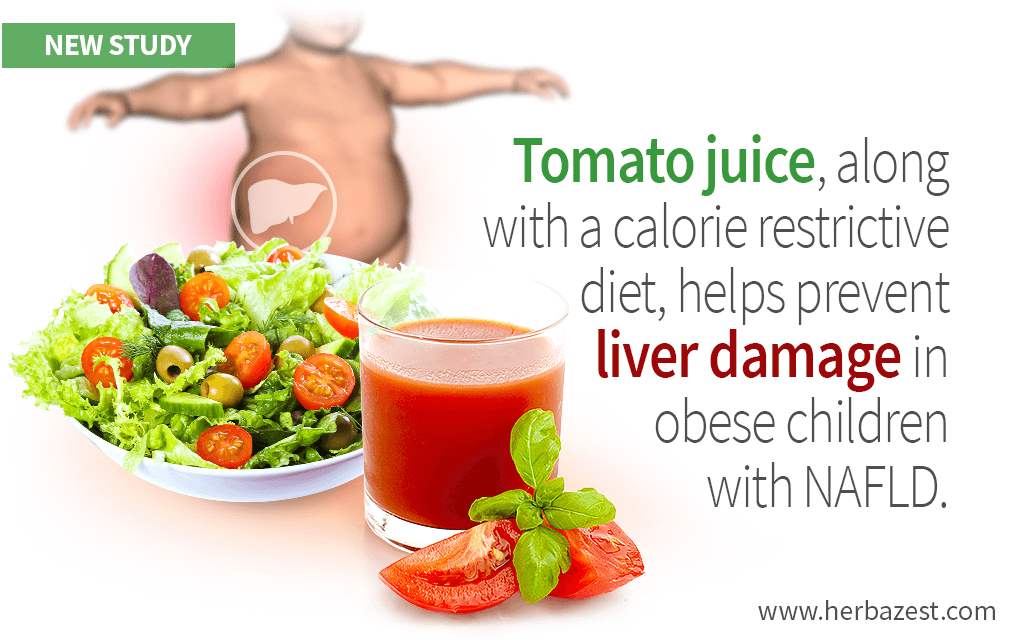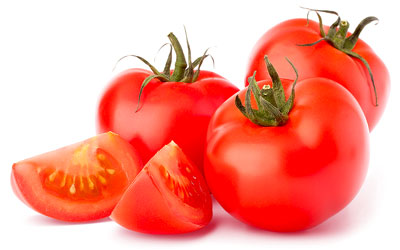Non-alcoholic fatty liver disease (NAFLD), characterized by an excess of fat in the liver (hepatic steatosis), is the most common liver disease among children.1 Because lifestyle modifications are the go-to therapy for NAFLD in children, there is a pressing need for effective and scientifically-proven approaches.
Since lycopene, which is abundantly found in tomatoes, is stored in the liver, it can exert its potent antioxidant functions locally, potentially improving disease outcomes. It is also an easy-to find and inexpensive fruit, making its potential therapeutic applications more widespread.
The purpose of this study was to evaluate the effects of a lycopene-enriched tomato juice on liver damage in obese children with NAFLD.
The Study
This 2020 randomized crossover trial was conducted by Italian scientists from the University of Naples Federico II in Naples, Italy. They published their discoveries in the Journal of Clinical Medicine.
Participants of this trial were 61 obese children with NAFLD, between the ages of 4 and 14. Before the start of the intervention, they underwent a washout, low-carotenoid diet for two weeks.
Then, they were randomly assigned to one of two groups and were placed on three, 60-day long regimens:
Days 1-60: Both groups received a restricted calorie regimen (1200 kcal Mediterranean style diet), with only one of the groups (labeled Group 2) also receiving 100 mL of lycopene-enriched tomato juice a day, containing 1 mL of vitamin D-enriched extra virgin olive oil with basil and oregano extracts.
Days 61-90: Since it was a crossover study, both groups then switched the regimens.
Days 91-120: Both groups followed the same restricted calorie regimen, without any tomato juice.
Compliance was verified on a weekly basis. Body measurements; liver size and degree of liver steatosis (fat build-up); and fasting blood samples were recorded before the trial and at the end of each of its segments.
The Results
Body weight decreased significantly in both groups, with a higher weight loss recorded in children taking tomato juice (4 kg in the first 60 days) than in those on a restricted calorie diet (1 kg in the first 60 days).
Children in Group 2 also kept a lower body mass index (BMI), showed a double decrease of abdominal fat loss percentage, and had higher fat loss throughout the trial.
The size of the liver showed greater reduction in children in Group 2 relative to those in Group 1. Both groups showed a significant liver fat reduction of the degrees of liver steatosis.
In Group 2, from eight children with severe hepatic steatosis at the beginning of the trial, only one remained classified as such after 90 days. In Group 1, this number was reduced from six children to only one.
What Does this Mean?
This clinical trial provides evidence that a calorie restrictive diet is an effective approach to slowing down the progression of NAFLD in obese children.
It has also shown that tomato juice supplementation can greatly enhance liver-protecting effects. Along with olive oil, basil, and oregano, it also helps enrich children's diets with key nutrients beneficial for their growth.
Identifying common, inexpensive foods, such as tomatoes, that play key therapeutic roles enables patients and their healthcare providers to prevent and manage various conditions without relying on pharmacology. This is especially valuable for children at crucial development stages.
Other herbs that are liver-healthy include grapefruits, blueberries, cranberries, and beets.
Sources
- Journal of Clinical Medicine, Randomised Clinical Trial: Calorie Restriction Regimen with Tomato Juice Supplementation Ameliorates Oxidative Stress, 2020
Footnotes:
- Children's Hospital of Philadelphia. (n.d.). Non-Alcoholic Fatty Liver Disease (NAFLD). Retrieved October 16, 2020 from https://www.chop.edu/conditions-diseases/non-alcoholic-fatty-liver-disease-nafld#





